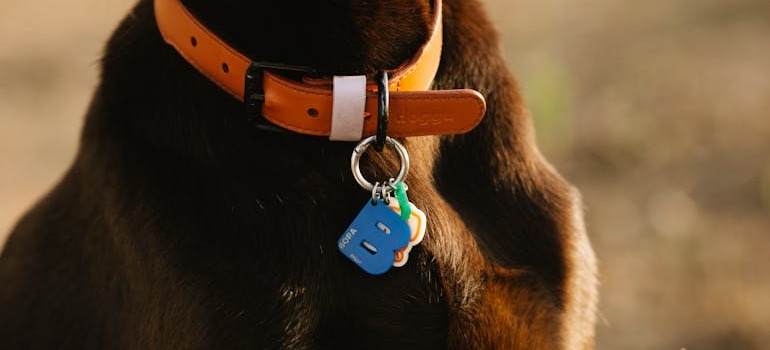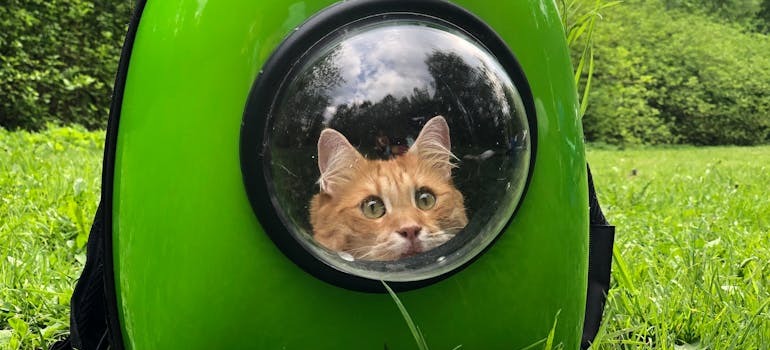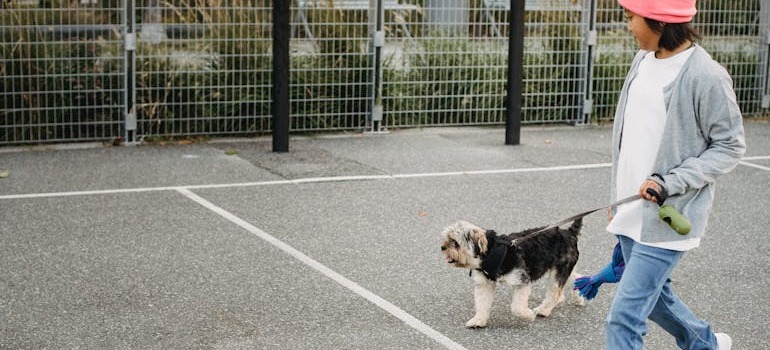There are not many easy things about moving. The whole process, from finding a new apartment to packing your things and delivering everything from point A to point B, can be a huge problem. One thing that can make this effort even more difficult is an interstate relocation with pets. Our furry friends may be as worried about moving as we are. Of course, look through what Best Movers Florida has to offer to ensure that you don’t have to worry. But besides that, let’s go over tips that can ensure that you get everything done perfectly.
Here Are Some Practical Tips for Interstate Relocation With Pets
Once you start packing things, they may begin to feel insecure. In addition, relocation and acclimatization to a new place can cause a lot of anxiety and stress. Just as you need to prepare your children for relocation, you also need to do something similar with your pets. So, if you are planning a move, just make sure you spend some time thinking about how to make this process a little less difficult for you and your pets.

Get their medical records
Depending on your mode of transport and where you are moving, you may need certain documents regarding the health of your pet. Keep your documents in a convenient place while you travel, as you may be asked to submit them along the way. The most often required documents are:
- Certificate of rabies vaccination. The current rabies label and vaccination certificate signed by your veterinarian is your pet’s most important travel document. When preparing for interstate relocation with pets, be sure to keep this certificate at your disposal.
- Certificate of health. A certificate signed by your veterinarian describing your pet, listing all vaccinations and indicating that your pet is healthy and free of infectious diseases. Health certificates are valid for a limited period of time – sometimes only 10 days. Make sure your pet arrives at its destination before its certificate expires.
Schedule a vet check-up
Scheduling a veterinary examination is crucial while preparing to move across state lines with pets. It guarantees your pet is well and has had all necessary vaccines prior to the move. A thorough examination makes it easier to identify potential health problems early on so you can address them before your relocation. Furthermore, your veterinarian may provide advice on how to help your pet manage travel anxiety as well as write prescriptions for any necessary medications. This proactive approach prioritizes your pet’s welfare and expedites the moving process. You may lessen tension and make it easier for you and your pet to adjust to your new home by taking these steps.
Update their tags and chips
Before you pack the first box, you must make sure that your pet’s collar tags are updated with your current phone number. What for? During the move, it so happens that your little guys can run away. And if they are scared (as they may be if you move large objects or make a lot of noise), this is much more likely.
Updated tags ensure that if they run away, someone will know who to call. You should also consider microchipping. If you have taken your animals from the shelter, they probably already have these chips. But if not, then microchips are another good security measure. Any veterinarian and many other pet professionals can scan the microchip to find information about the owner of the pet.

Update contact information
It is important to keep information up-to-date when it comes to your pets. Make sure your updated address and phone number are on file with your pet’s tags and microchip information. This is an essential measure to take in case your pet gets lost in the strange surroundings of your new area or during the transfer. You should also inquire for recommendations for a new veterinarian in your new area and let your present veterinarian know that you will be moving. Not only can updating your contact information come in handy during emergencies, but it also guarantees that you meet any local pet registration requirements. Making these arrangements in advance will guarantee a more seamless transfer and peace of mind when you and your cherished pet settle into your new residence.
Research pet regulations
Regarding health certificates, vaccines, and quarantine times, each state may have its own regulations. For specific rules, start by visiting the official websites of the states you will be moving to or traveling through. Certain breeds or species may be restricted in some states, while others may demand specific documents or immunizations. By being aware of these rules in advance, you can make sure you comply with the law, prepare all the required documents, and prevent last-minute problems or delays during your relocation. It also assists you in route planning, allowing you to make stops for health inspections and other obligations along the way. You can make sure that the migration goes well and without incident for both you and your pet by being proactive and well-informed.
Accustom them in advance to the carrier or box
If you are moving with cats or small dogs, they should be in a carrier or box when you move them from one apartment to another. This can create a problem if your pets do not have experience with these things. To ease their fear, take carriers or boxes long before moving to give them time to smell them and make sure they feel safe. You can even fill them with their favorite toys, goodies, and one of your T-shirts (your animals will find solace in your smell).

Gradually introduce changes
At times, pets can be similar to kids. So, like when you prepare children for relocation, you also need certain steps for pets. Start a gradual schedule and surroundings adjustment process several weeks prior to the relocation. To aid with their acclimatization, this involves modifying food, schedules, walking routes, and introducing travel carriers gradually. As much as possible, keeping them in their normal routines eases the change and lowers worry. Furthermore, if your pet is not used to traveling or being in a carrier, exposing them to new situations gradually will help them become used to the idea. You may reduce tension and make sure they acclimate to their new environment more easily once you get to your destination by implementing changes gradually and rewarding new experiences.
Make a transport plan
This can be a big problem during an interstate relocation with pets. You can be sure that the movers will most likely not be able to transport them. Therefore, you need another way to transport them to a new place. If you don’t have a car, you can see if you can borrow one from a friend. If not, you may need to take them in a taxi. In any case, your pets may develop motion sickness. See if your vet can give you any medications to give them, just in case. And try not to give them too much food in the morning of the relocation.
Consider hiring professional pet movers
You need to have professionals. Any interstate moving guide for beginners will tell you so. And when you have pets, things get even tougher. They can offer customized crates or carriers made to ensure the safety and comfort of pets while they are traveling. Expert pet movers are also aware of the particular rules and specifications that apply when moving animals over state boundaries. Personalized care and attention, such as timely updates while en route and paperwork assistance, are frequently included in their services. Choosing to use professional pet movers can reduce stress for you and your animal companion, freeing you up to concentrate on other moving-related tasks while guaranteeing your pet arrives at your new residence securely and on time.
Or consider other options for moving day
In addition, you can make other plans for your pets so that they are not part of the madness of the move. See if they can stay with a friend or neighbor the night before moving. Just wait until all your boxes and furniture are moved to a new place. This is a great idea for a number of reasons. On the one hand, this is a less stressful option for animals. And on the other hand, the likelihood that one of them will run away while your interstate movers Florida residents recommend pulling your sofa through the front door is much less. By completely removing them from the picture, you can get rid of stress.

Pack the pet box for your interstate relocation with pets
Just as you need to carry some important things with you – medicines, toiletries, a coffee maker, etc. – you need to make sure that you have several important things for pets in an easily accessible box. Keep there at least a couple of days of food, as well as toys, beds, extra litter for kittens. And everything else that your pet needs right away when you get to a new place. This definitely needs to be among the moving day tasks for an interstate relocation to make it successful.
Prepare an overnight kit
Make sure your pet has an overnight kit ready. Even for yourself, such a kit will be on any checklist of the things you need for a relocation to make it successful. Add necessities like bedding, favorite toys, food, water, bowls, and medications. Having familiar objects around eases anxiety and helps bring comfort during the transition. A leash, waste bags, grooming materials, and a first aid kit should also be included in case of any small emergency. It is easier to care for your pet throughout the move and keep them comfortable and secure as you both get used to your new surroundings if you have a well-organized overnight kit on hand.

Keep everyone locked up
If your pets live with you on the day you move, do not forget to place them in the same room, both in the old apartment and in the new one. Mark it with a sign so that your movers (or friends who help you move) do not open the door. If your pets are not limited, they can easily run away or be under someone’s feet, which is unsafe for anyone involved in the move. Also, keep your kids occupied while moving by assigning them to keep the pets in one room. This room will become the home of your pets in the new apartment. Fill it with food, water, and whatever they like.
Research pet-friendly accommodations
Seek out places that state clearly that pets are welcome, and be aware of their rules on pet size, breed limitations, and any additional costs. For added convenience at rest stops along the way, take into account the accessibility of pet-friendly parks or walking areas. Pet-friendly homes will mean a lot as your pets will be able to adjust without any time wasted. When you pick a home that fits your pets well, you can ensure that there are no problems and that you can enjoy it right from the start.

Stay patient
Animals may show signs of uneasiness or bewilderment during the relocation process and as they become used to their new surroundings. Moving can be difficult for them. It is crucial to keep your cool and show compassion while giving your pet comfort and solace during the process. Remember that they may need many days or even weeks to adjust to their new surroundings, so give them time to get acclimated. Keep feeding and exercise times as close to their usual timetables as you can to provide consistency. By being patient and aware of your pet’s requirements, you can help them adjust to their new home and ensure that they feel safe and loved.
Introduce them to the neighborhood
Whether you’re moving to the top pet-friendly cities in Florida or anywhere else, your neighborhood will be a completely new world for your pets. It’s important to provide them with comfort and safety in a new environment. Go out for small walks and ensure that they get to know the new sights, sounds, and smells. The more you allow them to explore, the easier everything can be. They can socialize with other animals and people in the neighborhood. Overall, this will be a crucial step when it comes to an interstate relocation with pets.
Create a safe space
Establishing a secure area for your pet is essential while moving across state lines. In your new house, set aside a peaceful, safe space where your pet can hide and feel at ease. To create a cozy and familiar atmosphere, arrange their bed, toys, and other belongings. Make sure there are no dangers in this area, including exposed wiring or poisonous plants. After they have made themselves at home in their safe haven, gradually introduce them to other parts of the house. This method lessens your pet’s worry and distress while they get used to their new surroundings. You can make the transition easier and increase their sense of comfort and security in their new house by putting their needs first.
Provide comfort items
Bring along their cherished playthings, cozy blankets, and bedding that smell just like their previous home. Having these things gives you a sense of security and comfort while traveling and when you get to your new house. To keep them active and diverted during the trip, add biscuits and chews as well. Comforting reminders of home are provided by familiar objects, which facilitate your pet’s quicker adjustment to new environments. You can help your pet overcome the difficulties of moving and make sure they feel safe and cared for during the shift by putting their mental well-being first and packing these comfort items on your list.

Monitor outdoor time after the interstate relocation with pets
Make sure your pet is safe by getting to know the area and any potential dangers, such as busy roads or strange fauna. Until your pet is comfortable in their new environment, keep them on a leash or in a safe place. Retain their normal workout regimens, keeping in mind any new rules or limitations in your new location. You can make your pet feel safe and avoid any mishaps or accidents during their relocation. This can be done by keeping an eye on their outdoor time and exposing them to the outdoors gradually.
Consider professional training
Expert trainers can assist in addressing behavioral problems that could emerge from the strain of relocating and acclimating to a new setting. Additionally, they can help teach fundamental directives that encourage safety and compliance, especially in strange environments. Training classes also offer your pet opportunities for controlled socializing, which makes it easier for them to adjust to new people, pets, and environments. Putting money into expert training improves your pet’s behavior and attentiveness, but it also fortifies your relationship with them and makes the relocation process easier for both of you.

Prepare for climate differences
To prepare for any necessary alterations for your pet’s comfort and well-being, familiarize yourself with the local environment and weather trends. This includes preparing warmer or colder climate-appropriate clothing or bedding, making sure warmer climates have access to shade and water, or thinking about indoor options for pets used to outdoor living. Your pet should be gradually acclimated to the new climate by being exposed to small variations in temperature and weather. It is possible to make sure they stay safe and comfortable during these changes by keeping an eye on their behavior and general well-being.
Stick to a routine
Finally, as far as possible, it’s important to stick to your pet’s typical daily routine. Of course, the moving day is hectic, so it may not be possible. But if you can feed and walk them according to the schedule that your pets are used to, this will greatly facilitate interstate relocation with pets. Similar to how you want to keep traditions alive in a new place, ensure your pets’ routines are also kept alive.

Monitor stress levels
Keep an eye out for symptoms of stress or worry, such as pacing, hiding, or heavy panting, that coincide with decreased eating. By sticking to routines and stocking the space with comforts, you can create a peaceful and comforting atmosphere. When traveling or arriving at your destination, try using relaxing methods like soft music and soft pet caresses to reduce anxiety. If you need safe medicine, speak with your veterinarian or try alternative therapies. Keeping an eye on your pet’s stress levels enables you to act quickly and modify your strategy to make your pet feel more comfortable and secure during the move. Putting their mental well-being first guarantees a more seamless transfer and promotes a happy experience as you both get settled into your new house.
Have a Worry-Free Relocation With Your Pets!
A quality relocation with your pets is something you must prepare for. Even the smallest of details can change your situation and create unnecessary problems. Don’t hesitate and ensure that you never have all that is needed to get the job done. Overall, an interstate relocation with pets is something you don’t want to do on a whim, and you want to ensure that both you and your pet are ready for the whole process. When everything is over, have some fun with your pet and get to know your surroundings.
